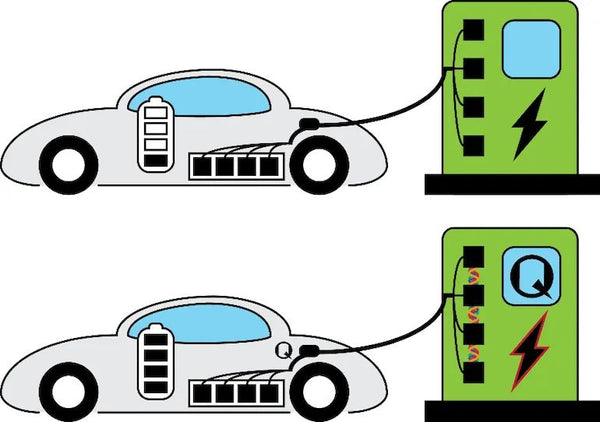Scientists claim they can use quantum technology resources to reduce a 10-hour charge time to three minutes.
Researchers have turned to quantum physics to find clues on how to create batteries for electric vehicles (EVs) that can be charged as fast as a tank of gasoline, if not faster.
A team of scientists from the Center for Theoretical Physics of Complex Systems at the Korea Institute for Basic Science (IBS) explored how to optimize quantum batteries for electric vehicles, determining how fast such a system can be charged.
Currently, an electric car takes about 10 hours to fully charge at home, and can be fully charged in 20 to 40 minutes at a charging station with the fastest superchargers. Ideally, to make these cars more attractive, the time required to recharge the battery should not exceed the time required to refuel the car.
To solve this problem, IBS scientists decided to turn to the field of quantum physics, an often mysterious field that studies matter and energy at the most fundamental level, aiming to reveal the nature and behavior of the building blocks of nature.
In their research, the team found that quantum technology may provide new mechanisms to charge batteries at a faster rate. These so-called "quantum batteries," proposed by scientists in 2012, could theoretically harness quantum resources, such as entanglement, to charge all cells within a battery at the same time collectively, significantly speeding up the battery charging process, the researchers said.
The quantum advantage
In fact, the high-capacity batteries needed for electric vehicles often contain many cells, and the advantages of charging them collectively outweigh the advantages of charging them independently in parallel, the researchers say, as measured by a ratio called the "quantum charging advantage." to measure.
Researchers have understood that there are two possible sources behind the quantum advantage, one called "global operation", where all cells can be connected to all other cells at the same time, and "all-to-all coupling" ( all-to-all coupling), each battery can be connected to other batteries, but only one battery can be connected at a time.
However, so far, it has not been clear whether these resources must occur simultaneously to gain a charging advantage, or whether there is a limit to the charging speed that can be achieved.
The IBS team decided to explore these questions, and found some answers that could lay the groundwork for creating faster-charging electric vehicle batteries, the researchers said.
In the report, one of their findings is that "all-to-all couplings" in quantum batteries are irrelevant; the other is that the emergence of "global operation" is the only component of quantum dominance.
The team also pinpointed the precise source of this advantage, while ruling out any other design possibilities, providing a blueprint for how to develop quantum batteries with optimized charging, the researchers said.

The picture above shows a comparison of current electric vehicles (EVs) and future quantum battery-based electric vehicles. The researchers found that using quantum charging would increase the charging speed of an average electric vehicle by 200 times, which means that the charging time at home can be reduced from 10 hours to 3 minutes, and the charging time at the charging station can be shortened from 30 minutes to 9 seconds.
From hours to minutes
In the future, the team will specifically quantify how fast charging can be achieved in the quantum design. While in classical batteries, the maximum charging speed increases linearly with the number of batteries, the IBS researchers found that quantum batteries can achieve quadratic scaling of charging speed through "global operation".
For example, if you consider that an average electric car contains 200 batteries, the speed of using quantum charging can be 200 times faster than that of ordinary batteries. This has the potential to bring home charging from 10 hours to 3 minutes, the researchers said. The charging time of the battery at the charging station takes 30 minutes, and in the future quantum batteries can theoretically be charged in a few seconds.
The researchers published the paper in Physical Review Letters.
The researchers say that while quantum battery research is still in its early stages, the implications for the design of future electric vehicle batteries are huge.
Also, EV batteries aren't the only area of their work. For example, the research could be applied to fusion power stations, which need to charge and discharge large amounts of energy in an instant.

